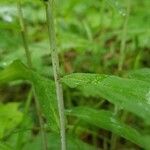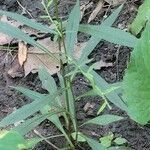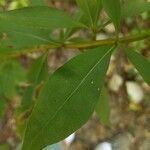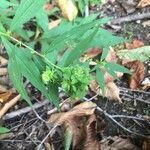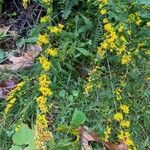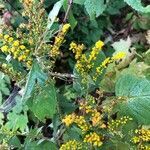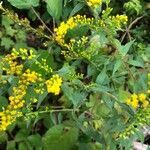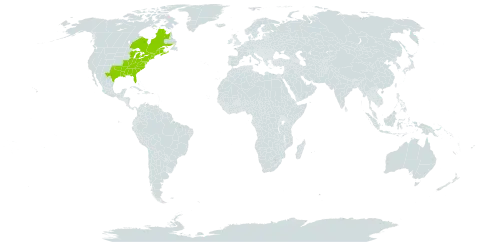Plants (20–)35–80(–100) cm; rhizomes woody, caudexlike. Stems 1–10+, usually blue to purple, glaucous, arching, straight , usually simple, occasionally with 2–3(–4) elongated lateral branches, glabrous or slightly strigose in arrays. Leaves: basal withering by flowering; proximal to mid cauline sessile, blades lanceolate, (47–)70–100(–150) × 8–20(–30) mm, margins serrate (with 0–24 teeth per side), apices acuminate, faces abaxially glabrous or sparsely hairy, adaxially sparsely hairy; distal sessile, blades narrowly lanceolate, (20–)40–70(–100) × (3.4–)5.6–11(–17) mm, margins entire to slightly serrate, faces glabrous or sparsely hairy. Heads 9–380, in short, secund, axillary and terminal racemo-paniculiform clusters (4.4–)13–36(–58) cm. Peduncles 2–10 mm, sparsely to moderately strigose; bracteoles linear, 1–8. Involucres narrowly campanulate, (3.5–)4.8–6(–7.2) mm. Phyllaries in ca. 3 series, unequal, outermost lanceolate (1–1.7 mm), acute, innermost linear-oblong (2.3–4 mm), 1-nerved, obtuse to acute. Ray florets 1–6; laminae (1.5–)2–3(–4) × ca. 1 mm. Disc florets 3–6(–9); corollas 2–3(–4) mm, lobes (0.5–)1–1.5(–2) mm. Cypselae 1–2(–2.5) mm, moderately to densely strigose; pappi 2–3(–3.7) mm.
More
Plants 3–10 dm from a short, stout, caudex-like rhizome, sometimes with long, creeping rhizomes as well; stem terete, glaucous; lvs chiefly cauline, ± serrate, acuminate, glabrous or slightly hairy, lanceolate or lance-elliptic, 6–12 × 1–3 cm, 3–10 times as long as wide, tapering to the sessile or obscurely short-petiolate base; infl chiefly axillary (sometimes branched) as in no. 19 [Solidago curtisii Torr. & A. Gray]; invol glabrous, 3–4.5 mm, its bracts narrow, obtuse or rounded, tending to be obscurely several-nerved; rays (1–)3–4(–5); disk-fls 5–8; achenes hairy; 2n=18. Woods; N.S. and s. Que. to Wis., s. to Fla. and Tex. An apparent hybrid with no. 30 [Solidago ulmifolia Muhl.] is S. ×ulmicaesia Friesner.
